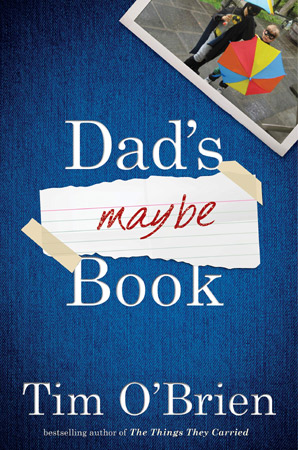
Mariner Books, 400 pages, paperback, $16.99
I’m afraid that those unfamiliar with Tim O’Brien might look at the paperback cover image and the almost-cute title and be misled. You might look at the smiles, read the words Dad’s Maybe Book, and be led to believe this is is lighthearted, easy reading with some cheesy tearjerker moments tossed in among a couple hundred pages of Hallmark feel-goodery.
You’d be wrong.
If you are familiar with Tim O’Brien, this is…well, it’s classic Tim O’Brien, and you know that means you’re in for depth and weight. Sure, his first new book in nearly two decades has got its lighthearted moments, as would any book ruminating on parenthood, but this is more than just a memoir about diaper changes and the trials of middle school basketball team tryouts. Rather, this book is a way for O’Brien, whose two sons were born when he was in his mid-50s, to speak to his children as if they were adults — because, as O’Brien acknowledges from the get-go, he is rapidly entering old age, just as his children are becoming teenagers, and he very well may not get to share in much of their respective adulthoods.
It is a sobering premise for a book, though O’Brien — most famous for his novels and memoirs about Vietnam — has never shied away from discussing mortality. Fact is, it’s the most common theme across his entire body of work. But I have to say, once you get over the quasi-morbid set-up (“I’m going to die, probably soon, so here are letters to my kids who I wish I could grow old with”), it’s actually a really cool idea — a wonderful gift for his boys, as well as for the readers he opens up to with these intimate thoughts.
The book bounces around in time a lot. At one moment, O’Brien is discussing his children as infants; the next, they are teenagers; in a following chapter, he might be journaling while his kids are still in elementary school.
Addressing this, O’Brien states, “In a novel or in a story, the illusion of order can be imposed on a human life. But in a book that remains essentially a compilation of love letters to my sons, the imposition of order would be an artificial disgrace and, worse yet, deceitful.”
Plenty of this book reads as letters to his kids; O’Brien directly addresses his boys as he posits his philosophies on life (and death, and war, and competition, and so on); he talks about his own past, his childhood, his hometown, his relationship with his parents; he tells his kids tales of their early lives that they might not remember themselves, always tying it to a larger theme or discussion. Many chapters could be standalone essays (e.g., this excerpt, “Where is Our Allegiance to the ‘Toneless Dead’?”). Some chapters are pithy, single-page anecdotes. And sometimes he assigns “homework” in various chapters he titles “Home School,” wherein he asks his kids (as adults) to read certain stories, poems, or books (he’s heavy into Hemingway) that are important to him.
Writing this, I feel I’m failing to sell it or make it sound interesting. But O’Brien makes it work.
You do not need to be a parent to enjoy this book. I think parenthood may possibly add an element of relatability to it, but it’s not necessary. Anyone who has ever loved anyone would enjoy this book. And anyone who has ever found their thoughts returning to Cacciato or the stories in The Things They Carried, long after they’ve read the books, should absolutely pick it up. If this is O’Brien’s last literary contribution to the world, then he’s leaving us with one of his best. May he still have many years ahead of him.